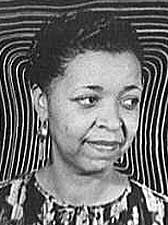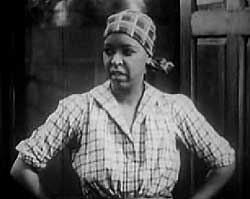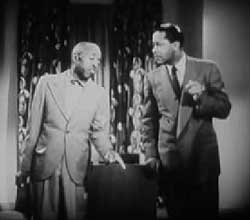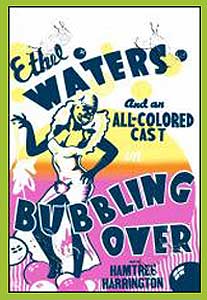In a Harlem flat, Ethel (Ethel Waters) works night & day feeding & cleaning up after her loafter of a husband & his exceedingly numerous useless relatives who've taken over the place without ever helping, treating her as their personal maid.
Bubbling Over (1934) is a short "soundie," such as were the music videos of their day. Many a soundie featured all-black casts, with slim stories concocted, on which to hang a number of songs.
 Ethel sings "Taking Your Time" to her lazy hubby, who can't be woken up from his nap even if poked with a safety-pin. As if she weren't taking care of enough of his relatives, there comes a knock at the door, & Joe & his three brothers barge in expecting to stay. Ethel sings "Taking Your Time" to her lazy hubby, who can't be woken up from his nap even if poked with a safety-pin. As if she weren't taking care of enough of his relatives, there comes a knock at the door, & Joe & his three brothers barge in expecting to stay.
These guys are the Southernaires Quartet. The Southerneraires had a life television show on ABC in 1948 predating Nat King Cole's quarter-hour program, & had been big radio stars throughout the '40s.
Shortly after their arrival, they sing the wonderfully upbeat "Hang Your Hat in a Harlem Flat" before they begin making all sorts of demands as to what they want to eat how they want their rooms kept. So Esther tosses them out.
While doing the laundry Ethel sings a sweet blues song "Darkies Never Dream" that'd be a hard song to cover today without being pillaried, but Esther puts her heart into it.
Swami Rivers the mindreader (Frank L. Wilson) is something of a flimflam artist in a turban. He gives Esther a reading about a wealthy relation named Presby who is coming to share his money. The whole family begins to look forward to this & group-sings "Company's Coming Tonight."
Presby (comedian Ham Tree Harrington) knows nothing at all about being rich. He's only just gotten out of prison & heads off to Esther's place, where he begins robbing all the family members of pocket watches & what-not, ultimately stealing even the clothes they were wearing. The closing number is the gospel tune "I Can See Saint Peter Standing by the Barn."
 Ham Tree Harrington (or Hamtree) might be a little hard for modern sensibilities but his performance as the family thief should be kept in context. Ham Tree Harrington (or Hamtree) might be a little hard for modern sensibilities but his performance as the family thief should be kept in context.
Ham Tree had been a black-face minstrel performer in the Roaring 'Twenties, a time when all black reviews for black audiences expected comics to use burnt cork on their faces because that's just how it was done. He was one of the biggest stars of the day, famous "from Dixie to Broadway."
He had one hit song, the moody complain' "Nobody Ever Let Me In On Nothin'" but in Bubbling Over we don't get to hear him sing, restricted here to his abilities as a comedian.
He popularized the "scared darkie" routine which became such an awful stereotype in old Hollywood thrillers & comedies alike, but when done for black audiences there was a certain irony that got lost when white directors & white writers refashioned the character for their own films. Another of his Vaudevillian characterizations was the short tempered bully overcompensating for his lack of height.
In Bubbling Over Ham Tree has only a few minutes of screen time in which to make an impact, & it's obvious he was a genuine talent. Despite that he's playing a stereotypical thief, he gives the character a surprising depth, being more klepto than criminal, & believing himself to be the Emperor Jones.
By the time he appeared in this film his heyday (the Roaring Twenties) had already passed & he could only have been a draw in an all-black film originally seen only in black neighborhood theaters.
Esther of course was a brilliant talent as actor as well as singer, with cross-over appeal for white America too. Her starring role in this short film isn't much because as so often the case it's reliant on race stereotypes for its flimsy plot. But it's not crummy either because the cast has real talent, & it's more than just historical value makes it worth watching. It's a chance to see the great Ethel Waters center stage.
Mister Adam's Bomb (1949) is an odd little film as it starts out hinting that it intends to be a jazz soundie, but it's main intent is to portray a black family gathering & party completely devoid of jive.
 The film was made by "Sepia Productions" which company sought in part to present images of African Americans not seen in white-produced movies. The film was made by "Sepia Productions" which company sought in part to present images of African Americans not seen in white-produced movies.
The musical interludes with black performers in many films were set to boogy-woogy music & apt to be set in raunchy clubs. Apparently Mister Adam's Bomb wanted to portray "wholesome" Black America.
So at the start when Johnson's wife & daughter disapprove of his fondness for jive (he's seen dancing with the maid to a jazz recording), it's not a set-up for them to be won over to jazz. When the entertainment begins, it'll be as far from jazz as possible.
The plot of this short film is that the upstairs border, Adam Jones, has been seen sneaking in the house late at night with round packages, which starts the rumor that he's building an atom bomb in his room. There's going to be a party at the house that night & Johnson makes sure his police detective friend is invited, so he can have a chance to investigate the possiblity of there being a bomb in the house.
The detective has a comic relief sidekick with a cowardly nature. Their routine, brave cop & scared pal, is funny enough. It doesn't come off as one of those "skirt darkie" routines because we've no doubt that the tall handsome officer is brave, & just trying to talk his pal into believing in himself as well.
At the party, the first entertainment is Margaret Westfield, a slenderly junoesque singer who performs "You Can Always Believe Your Heart," as far distant from popular jazz or swing as any nicely sung song could get.
Westfield sings the only song in the film, so this never develops into a full-fledged "soundie" which existed primarily for musical numbers, though it ends up on lists of soundies even so. Her song is followed by a group of dancers who are totally amateur, as though the sensual jazz dancers of other films, & the idea that black folk got rhythm, was another stereotype the Sepia Productions folks didn't want to perpetuate.
Throughout we get shots of the audience sitting around the living room like the most upwardly mobile middleclass people.
The heart of the film is Adam Jones doing a magic act for comedy effect, getting the "cowardly" cop's sidekick character from the audience for the amazing trick of ramming a butcher knife into the top of his skull. Our "coward" does muster the bravery to go through with the trick, & it's an amusing long bit.
Adam is played by Eddie Green, a monologist, radio star, & Vaudevillian, who died relatively young the following year, so this was to be his last film appearance.
He wrote one of the jazz standards of the Roaring Twenties, "A Good Man Is Hard to Find," so it's curious he would star in & direct a film that so greatly veers away from jazz. The song performed by Margaret Westfield was also written by Eddie. He was additionally the primary owner of Los Angeles-based Sepia Productions aka Sepia-Art Picture Company.
Eddie's biggest national reputation among white as well as black audiences was as Eddie the janitor-waiter on the radio program Duffy's Tavern. He was a first-rate comic actor & frequently stole the show from Ed Gardner who played Archie the bar's manager, & was most certainly smarter than Archie.
Had he lived even one more decade I believe he'd've been on some early b/w television program & become as well remembered as Eddie "Rochester" Anderson, but as it stands, he's well remembered only by old time radio fanatics.
While Adam Jones is performing his magic act, the cop sneaks upstairs & of course finds nothing illegal. The "bomb" turns out to be an improbably globe-shaped box containing a string of pearls, gift for his niece Nadine. Another round object he had hidden was the cabbage head required for his magic act. All's well that ends funny.
copyright © by Paghat the Ratgirl
|

 Ethel sings "Taking Your Time" to her lazy hubby, who can't be woken up from his nap even if poked with a safety-pin. As if she weren't taking care of enough of his relatives, there comes a knock at the door, & Joe & his three brothers barge in expecting to stay.
Ethel sings "Taking Your Time" to her lazy hubby, who can't be woken up from his nap even if poked with a safety-pin. As if she weren't taking care of enough of his relatives, there comes a knock at the door, & Joe & his three brothers barge in expecting to stay.
 The film was made by "Sepia Productions" which company sought in part to present images of African Americans not seen in white-produced movies.
The film was made by "Sepia Productions" which company sought in part to present images of African Americans not seen in white-produced movies.